Person Centred Care: Reflective Learning Approaches in Healthcare
VerifiedAdded on 2022/08/08
|16
|4543
|58
Report
AI Summary
This report delves into the multifaceted realm of person-centred care, examining its core principles and practical applications within healthcare settings. It analyzes various approaches to patient care, emphasizing the importance of individualized treatment plans and the adaptation of care strategies to meet specific patient needs, as exemplified by a case study involving a patient with autistic spectrum disorder and learning disabilities. The report explores the challenges inherent in adopting person-centred approaches, such as the complexities of patient assessment and the need for healthcare professionals to adapt to diverse patient behaviors. Furthermore, it evaluates the effectiveness of person-centred care through the analysis of patient outcomes, considering factors such as patient happiness and stress levels. The report also examines current policies and regulations, including the Mental Capacity Act 2005 and care and support statutory guidance, and discusses the implications of these regulations for healthcare professionals. A reflective account, utilizing the Gibbs learning cycle, provides a personal perspective on the application of person-centred care, highlighting experiences, feelings, and evaluations of practice. Finally, the report outlines plans for professional development, including short-term, medium-term, and long-term goals, and underscores the contribution of reflective practice to personal and professional growth.

Approcahes of person centred care
Paraphrase This Document
Need a fresh take? Get an instant paraphrase of this document with our AI Paraphraser
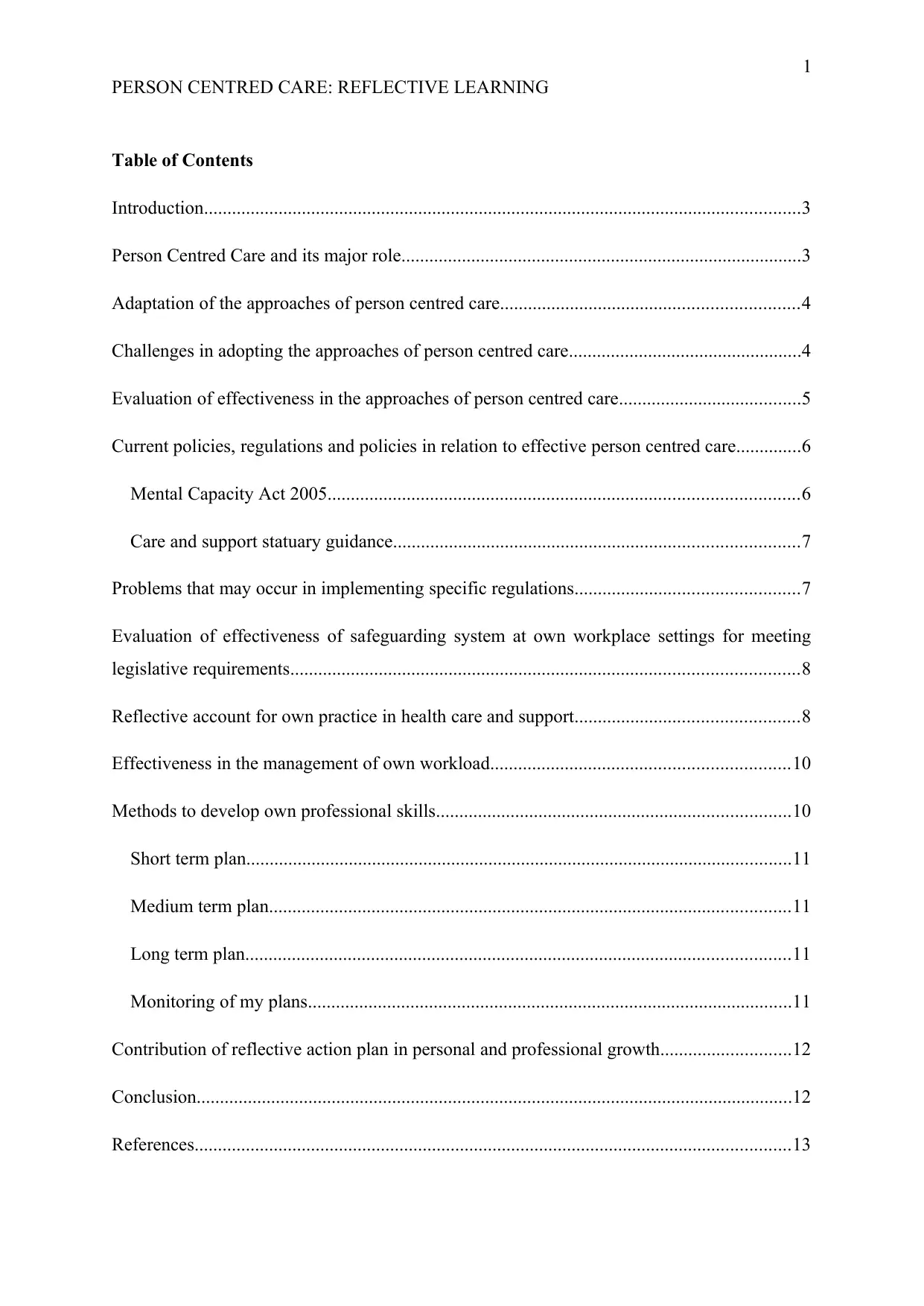
1
PERSON CENTRED CARE: REFLECTIVE LEARNING
Table of Contents
Introduction................................................................................................................................3
Person Centred Care and its major role......................................................................................3
Adaptation of the approaches of person centred care................................................................4
Challenges in adopting the approaches of person centred care..................................................4
Evaluation of effectiveness in the approaches of person centred care.......................................5
Current policies, regulations and policies in relation to effective person centred care..............6
Mental Capacity Act 2005.....................................................................................................6
Care and support statuary guidance.......................................................................................7
Problems that may occur in implementing specific regulations................................................7
Evaluation of effectiveness of safeguarding system at own workplace settings for meeting
legislative requirements.............................................................................................................8
Reflective account for own practice in health care and support................................................8
Effectiveness in the management of own workload................................................................10
Methods to develop own professional skills............................................................................10
Short term plan.....................................................................................................................11
Medium term plan................................................................................................................11
Long term plan.....................................................................................................................11
Monitoring of my plans........................................................................................................11
Contribution of reflective action plan in personal and professional growth............................12
Conclusion................................................................................................................................12
References................................................................................................................................13
PERSON CENTRED CARE: REFLECTIVE LEARNING
Table of Contents
Introduction................................................................................................................................3
Person Centred Care and its major role......................................................................................3
Adaptation of the approaches of person centred care................................................................4
Challenges in adopting the approaches of person centred care..................................................4
Evaluation of effectiveness in the approaches of person centred care.......................................5
Current policies, regulations and policies in relation to effective person centred care..............6
Mental Capacity Act 2005.....................................................................................................6
Care and support statuary guidance.......................................................................................7
Problems that may occur in implementing specific regulations................................................7
Evaluation of effectiveness of safeguarding system at own workplace settings for meeting
legislative requirements.............................................................................................................8
Reflective account for own practice in health care and support................................................8
Effectiveness in the management of own workload................................................................10
Methods to develop own professional skills............................................................................10
Short term plan.....................................................................................................................11
Medium term plan................................................................................................................11
Long term plan.....................................................................................................................11
Monitoring of my plans........................................................................................................11
Contribution of reflective action plan in personal and professional growth............................12
Conclusion................................................................................................................................12
References................................................................................................................................13
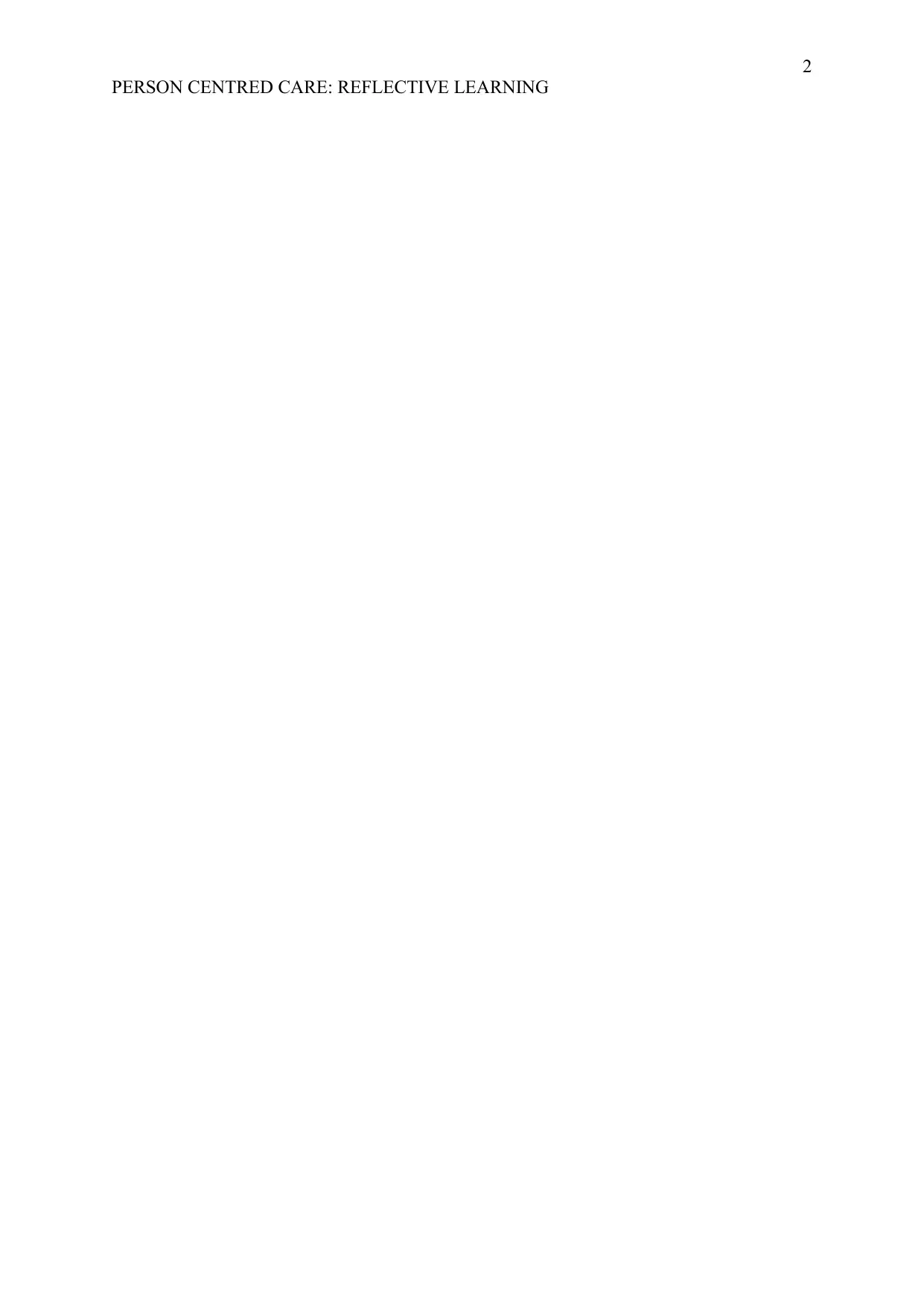
2
PERSON CENTRED CARE: REFLECTIVE LEARNING
PERSON CENTRED CARE: REFLECTIVE LEARNING
⊘ This is a preview!⊘
Do you want full access?
Subscribe today to unlock all pages.

Trusted by 1+ million students worldwide
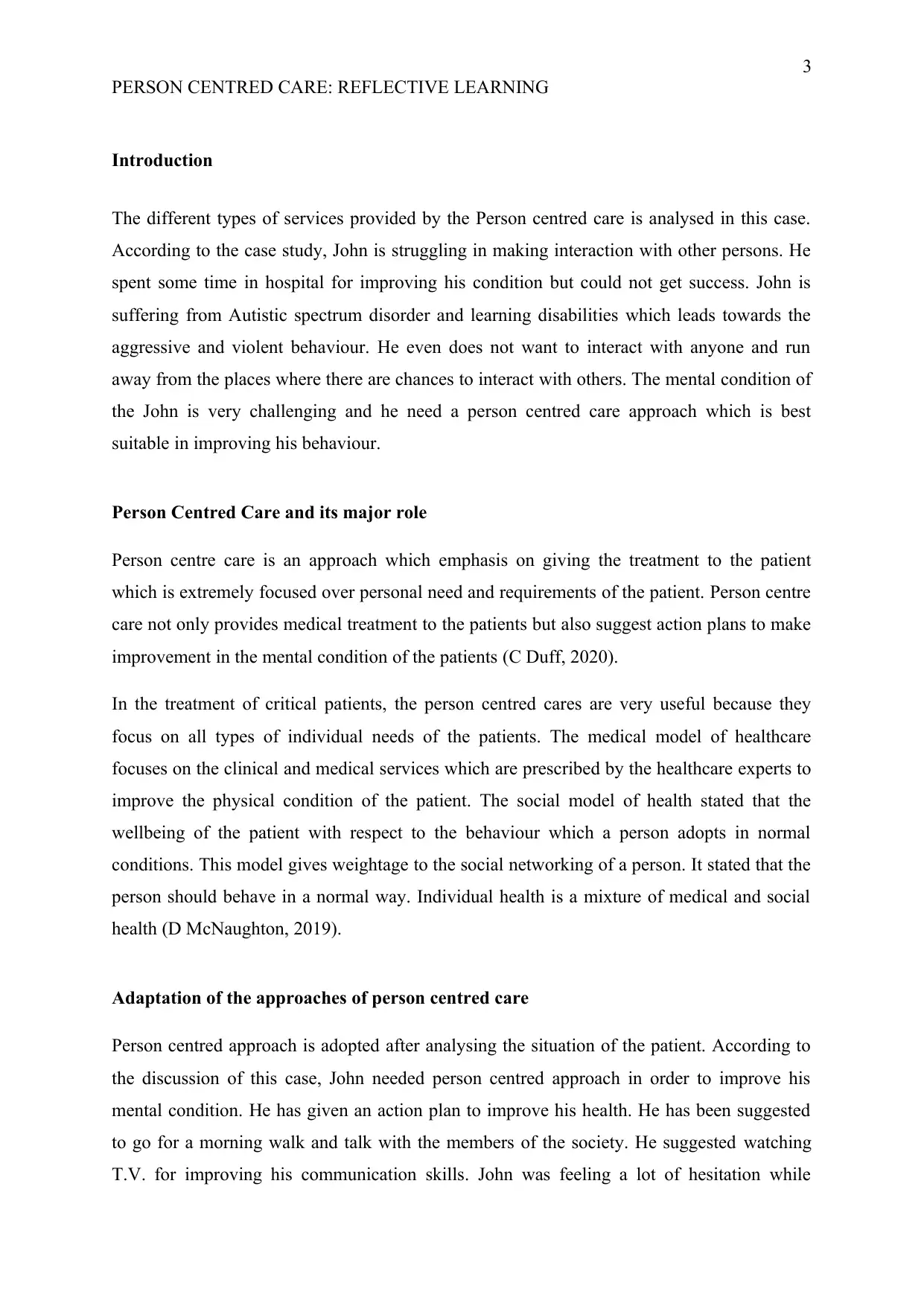
3
PERSON CENTRED CARE: REFLECTIVE LEARNING
Introduction
The different types of services provided by the Person centred care is analysed in this case.
According to the case study, John is struggling in making interaction with other persons. He
spent some time in hospital for improving his condition but could not get success. John is
suffering from Autistic spectrum disorder and learning disabilities which leads towards the
aggressive and violent behaviour. He even does not want to interact with anyone and run
away from the places where there are chances to interact with others. The mental condition of
the John is very challenging and he need a person centred care approach which is best
suitable in improving his behaviour.
Person Centred Care and its major role
Person centre care is an approach which emphasis on giving the treatment to the patient
which is extremely focused over personal need and requirements of the patient. Person centre
care not only provides medical treatment to the patients but also suggest action plans to make
improvement in the mental condition of the patients (C Duff, 2020).
In the treatment of critical patients, the person centred cares are very useful because they
focus on all types of individual needs of the patients. The medical model of healthcare
focuses on the clinical and medical services which are prescribed by the healthcare experts to
improve the physical condition of the patient. The social model of health stated that the
wellbeing of the patient with respect to the behaviour which a person adopts in normal
conditions. This model gives weightage to the social networking of a person. It stated that the
person should behave in a normal way. Individual health is a mixture of medical and social
health (D McNaughton, 2019).
Adaptation of the approaches of person centred care
Person centred approach is adopted after analysing the situation of the patient. According to
the discussion of this case, John needed person centred approach in order to improve his
mental condition. He has given an action plan to improve his health. He has been suggested
to go for a morning walk and talk with the members of the society. He suggested watching
T.V. for improving his communication skills. John was feeling a lot of hesitation while
PERSON CENTRED CARE: REFLECTIVE LEARNING
Introduction
The different types of services provided by the Person centred care is analysed in this case.
According to the case study, John is struggling in making interaction with other persons. He
spent some time in hospital for improving his condition but could not get success. John is
suffering from Autistic spectrum disorder and learning disabilities which leads towards the
aggressive and violent behaviour. He even does not want to interact with anyone and run
away from the places where there are chances to interact with others. The mental condition of
the John is very challenging and he need a person centred care approach which is best
suitable in improving his behaviour.
Person Centred Care and its major role
Person centre care is an approach which emphasis on giving the treatment to the patient
which is extremely focused over personal need and requirements of the patient. Person centre
care not only provides medical treatment to the patients but also suggest action plans to make
improvement in the mental condition of the patients (C Duff, 2020).
In the treatment of critical patients, the person centred cares are very useful because they
focus on all types of individual needs of the patients. The medical model of healthcare
focuses on the clinical and medical services which are prescribed by the healthcare experts to
improve the physical condition of the patient. The social model of health stated that the
wellbeing of the patient with respect to the behaviour which a person adopts in normal
conditions. This model gives weightage to the social networking of a person. It stated that the
person should behave in a normal way. Individual health is a mixture of medical and social
health (D McNaughton, 2019).
Adaptation of the approaches of person centred care
Person centred approach is adopted after analysing the situation of the patient. According to
the discussion of this case, John needed person centred approach in order to improve his
mental condition. He has given an action plan to improve his health. He has been suggested
to go for a morning walk and talk with the members of the society. He suggested watching
T.V. for improving his communication skills. John was feeling a lot of hesitation while
Paraphrase This Document
Need a fresh take? Get an instant paraphrase of this document with our AI Paraphraser
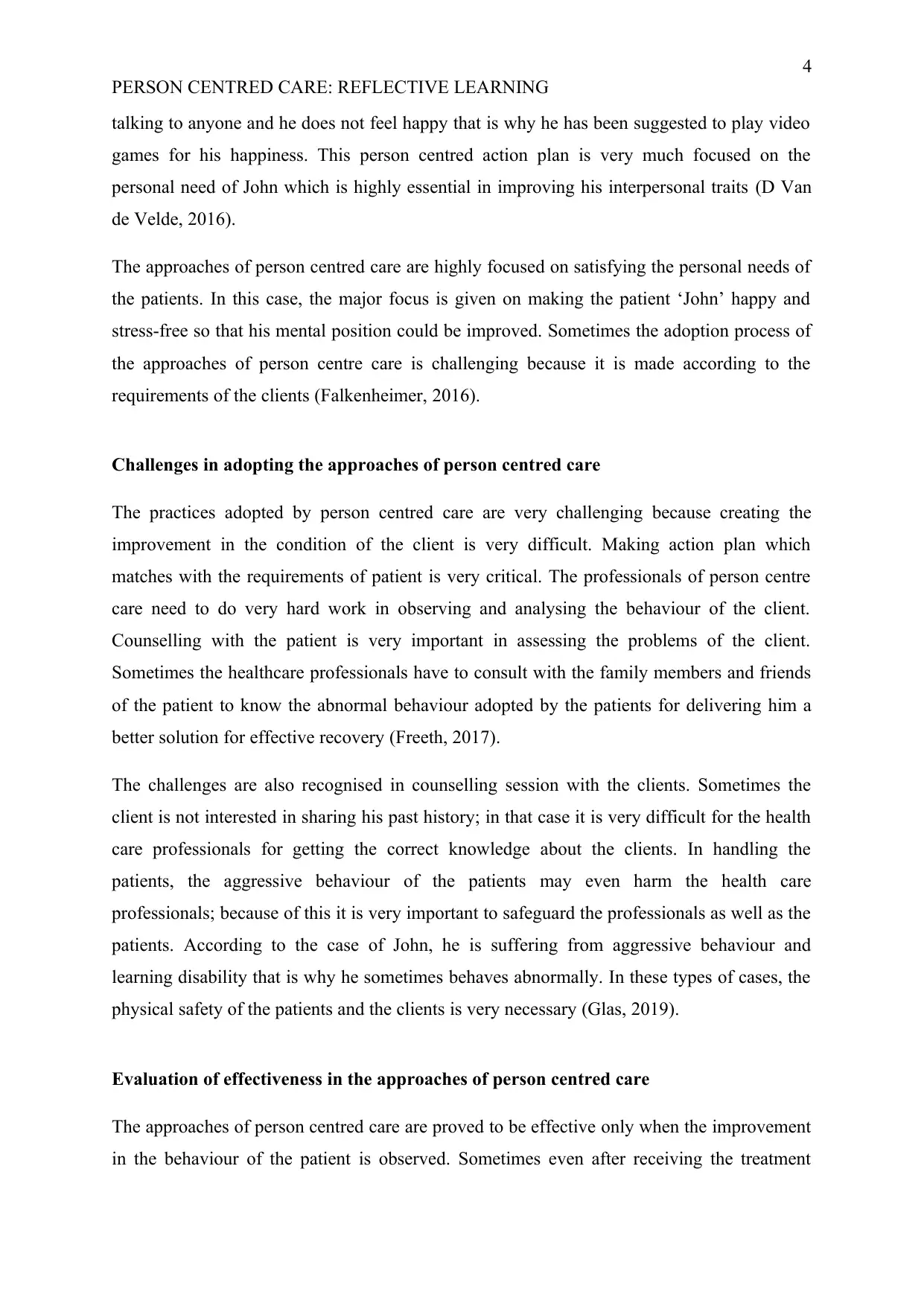
4
PERSON CENTRED CARE: REFLECTIVE LEARNING
talking to anyone and he does not feel happy that is why he has been suggested to play video
games for his happiness. This person centred action plan is very much focused on the
personal need of John which is highly essential in improving his interpersonal traits (D Van
de Velde, 2016).
The approaches of person centred care are highly focused on satisfying the personal needs of
the patients. In this case, the major focus is given on making the patient ‘John’ happy and
stress-free so that his mental position could be improved. Sometimes the adoption process of
the approaches of person centre care is challenging because it is made according to the
requirements of the clients (Falkenheimer, 2016).
Challenges in adopting the approaches of person centred care
The practices adopted by person centred care are very challenging because creating the
improvement in the condition of the client is very difficult. Making action plan which
matches with the requirements of patient is very critical. The professionals of person centre
care need to do very hard work in observing and analysing the behaviour of the client.
Counselling with the patient is very important in assessing the problems of the client.
Sometimes the healthcare professionals have to consult with the family members and friends
of the patient to know the abnormal behaviour adopted by the patients for delivering him a
better solution for effective recovery (Freeth, 2017).
The challenges are also recognised in counselling session with the clients. Sometimes the
client is not interested in sharing his past history; in that case it is very difficult for the health
care professionals for getting the correct knowledge about the clients. In handling the
patients, the aggressive behaviour of the patients may even harm the health care
professionals; because of this it is very important to safeguard the professionals as well as the
patients. According to the case of John, he is suffering from aggressive behaviour and
learning disability that is why he sometimes behaves abnormally. In these types of cases, the
physical safety of the patients and the clients is very necessary (Glas, 2019).
Evaluation of effectiveness in the approaches of person centred care
The approaches of person centred care are proved to be effective only when the improvement
in the behaviour of the patient is observed. Sometimes even after receiving the treatment
PERSON CENTRED CARE: REFLECTIVE LEARNING
talking to anyone and he does not feel happy that is why he has been suggested to play video
games for his happiness. This person centred action plan is very much focused on the
personal need of John which is highly essential in improving his interpersonal traits (D Van
de Velde, 2016).
The approaches of person centred care are highly focused on satisfying the personal needs of
the patients. In this case, the major focus is given on making the patient ‘John’ happy and
stress-free so that his mental position could be improved. Sometimes the adoption process of
the approaches of person centre care is challenging because it is made according to the
requirements of the clients (Falkenheimer, 2016).
Challenges in adopting the approaches of person centred care
The practices adopted by person centred care are very challenging because creating the
improvement in the condition of the client is very difficult. Making action plan which
matches with the requirements of patient is very critical. The professionals of person centre
care need to do very hard work in observing and analysing the behaviour of the client.
Counselling with the patient is very important in assessing the problems of the client.
Sometimes the healthcare professionals have to consult with the family members and friends
of the patient to know the abnormal behaviour adopted by the patients for delivering him a
better solution for effective recovery (Freeth, 2017).
The challenges are also recognised in counselling session with the clients. Sometimes the
client is not interested in sharing his past history; in that case it is very difficult for the health
care professionals for getting the correct knowledge about the clients. In handling the
patients, the aggressive behaviour of the patients may even harm the health care
professionals; because of this it is very important to safeguard the professionals as well as the
patients. According to the case of John, he is suffering from aggressive behaviour and
learning disability that is why he sometimes behaves abnormally. In these types of cases, the
physical safety of the patients and the clients is very necessary (Glas, 2019).
Evaluation of effectiveness in the approaches of person centred care
The approaches of person centred care are proved to be effective only when the improvement
in the behaviour of the patient is observed. Sometimes even after receiving the treatment
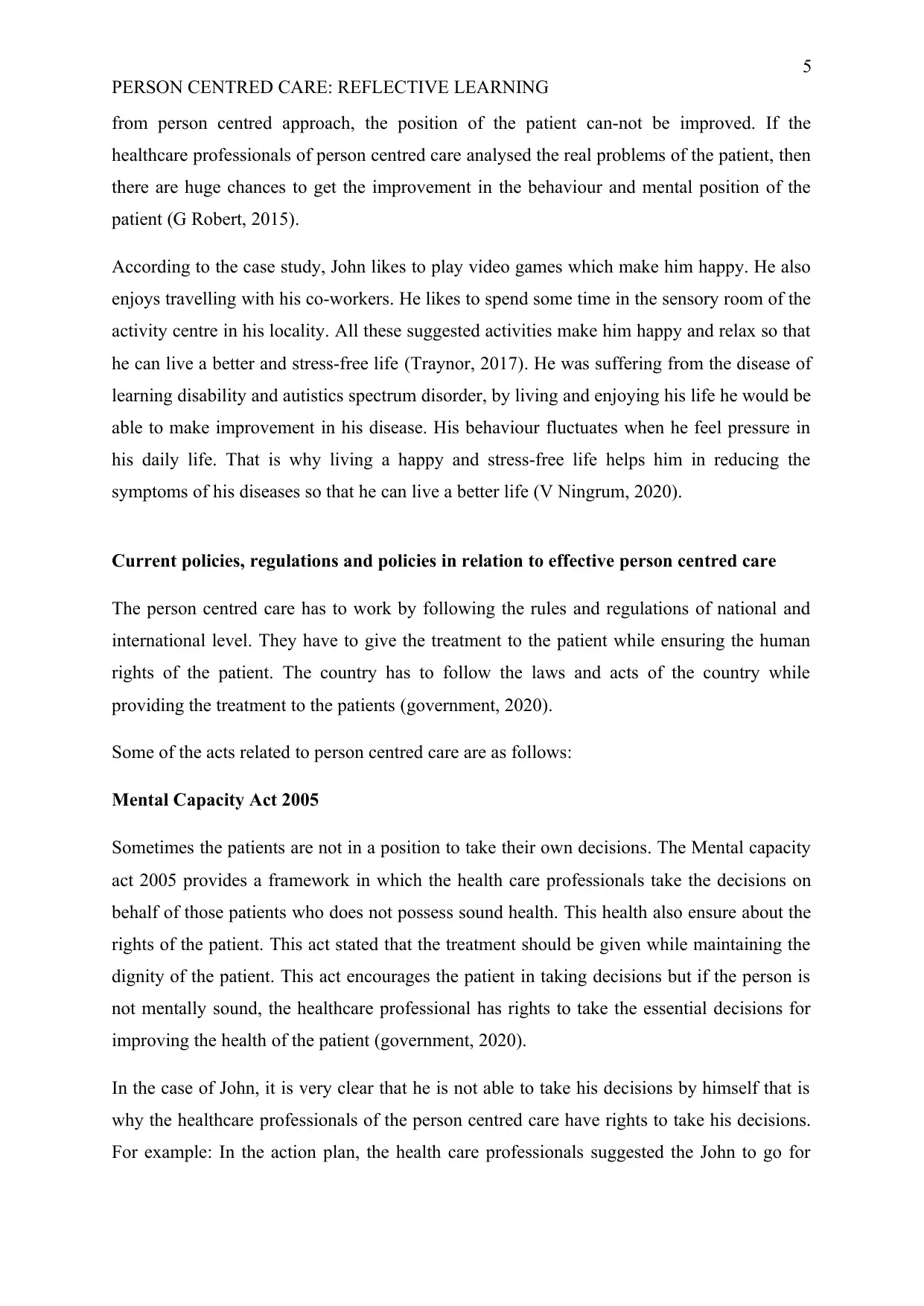
5
PERSON CENTRED CARE: REFLECTIVE LEARNING
from person centred approach, the position of the patient can-not be improved. If the
healthcare professionals of person centred care analysed the real problems of the patient, then
there are huge chances to get the improvement in the behaviour and mental position of the
patient (G Robert, 2015).
According to the case study, John likes to play video games which make him happy. He also
enjoys travelling with his co-workers. He likes to spend some time in the sensory room of the
activity centre in his locality. All these suggested activities make him happy and relax so that
he can live a better and stress-free life (Traynor, 2017). He was suffering from the disease of
learning disability and autistics spectrum disorder, by living and enjoying his life he would be
able to make improvement in his disease. His behaviour fluctuates when he feel pressure in
his daily life. That is why living a happy and stress-free life helps him in reducing the
symptoms of his diseases so that he can live a better life (V Ningrum, 2020).
Current policies, regulations and policies in relation to effective person centred care
The person centred care has to work by following the rules and regulations of national and
international level. They have to give the treatment to the patient while ensuring the human
rights of the patient. The country has to follow the laws and acts of the country while
providing the treatment to the patients (government, 2020).
Some of the acts related to person centred care are as follows:
Mental Capacity Act 2005
Sometimes the patients are not in a position to take their own decisions. The Mental capacity
act 2005 provides a framework in which the health care professionals take the decisions on
behalf of those patients who does not possess sound health. This health also ensure about the
rights of the patient. This act stated that the treatment should be given while maintaining the
dignity of the patient. This act encourages the patient in taking decisions but if the person is
not mentally sound, the healthcare professional has rights to take the essential decisions for
improving the health of the patient (government, 2020).
In the case of John, it is very clear that he is not able to take his decisions by himself that is
why the healthcare professionals of the person centred care have rights to take his decisions.
For example: In the action plan, the health care professionals suggested the John to go for
PERSON CENTRED CARE: REFLECTIVE LEARNING
from person centred approach, the position of the patient can-not be improved. If the
healthcare professionals of person centred care analysed the real problems of the patient, then
there are huge chances to get the improvement in the behaviour and mental position of the
patient (G Robert, 2015).
According to the case study, John likes to play video games which make him happy. He also
enjoys travelling with his co-workers. He likes to spend some time in the sensory room of the
activity centre in his locality. All these suggested activities make him happy and relax so that
he can live a better and stress-free life (Traynor, 2017). He was suffering from the disease of
learning disability and autistics spectrum disorder, by living and enjoying his life he would be
able to make improvement in his disease. His behaviour fluctuates when he feel pressure in
his daily life. That is why living a happy and stress-free life helps him in reducing the
symptoms of his diseases so that he can live a better life (V Ningrum, 2020).
Current policies, regulations and policies in relation to effective person centred care
The person centred care has to work by following the rules and regulations of national and
international level. They have to give the treatment to the patient while ensuring the human
rights of the patient. The country has to follow the laws and acts of the country while
providing the treatment to the patients (government, 2020).
Some of the acts related to person centred care are as follows:
Mental Capacity Act 2005
Sometimes the patients are not in a position to take their own decisions. The Mental capacity
act 2005 provides a framework in which the health care professionals take the decisions on
behalf of those patients who does not possess sound health. This health also ensure about the
rights of the patient. This act stated that the treatment should be given while maintaining the
dignity of the patient. This act encourages the patient in taking decisions but if the person is
not mentally sound, the healthcare professional has rights to take the essential decisions for
improving the health of the patient (government, 2020).
In the case of John, it is very clear that he is not able to take his decisions by himself that is
why the healthcare professionals of the person centred care have rights to take his decisions.
For example: In the action plan, the health care professionals suggested the John to go for
⊘ This is a preview!⊘
Do you want full access?
Subscribe today to unlock all pages.

Trusted by 1+ million students worldwide
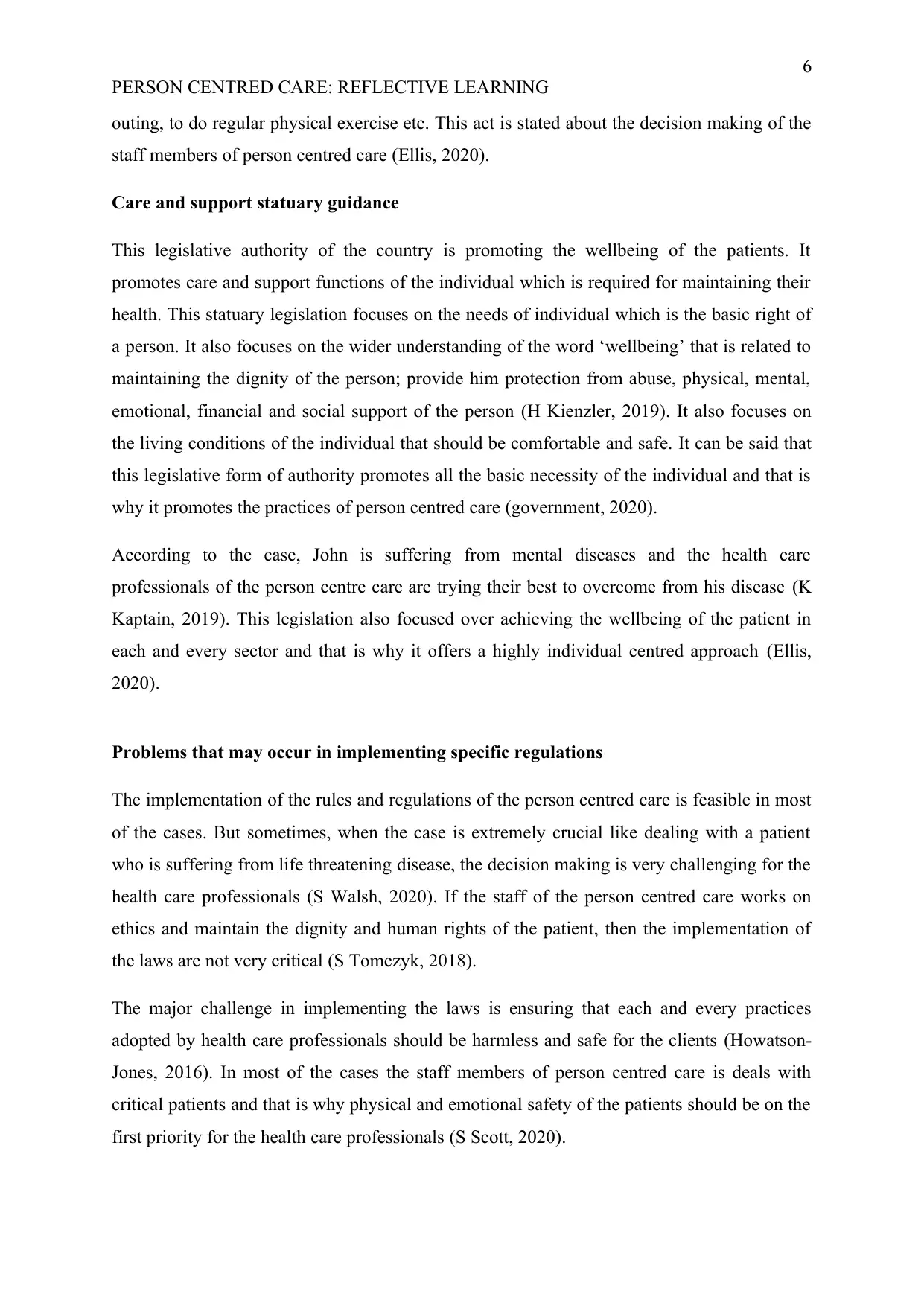
6
PERSON CENTRED CARE: REFLECTIVE LEARNING
outing, to do regular physical exercise etc. This act is stated about the decision making of the
staff members of person centred care (Ellis, 2020).
Care and support statuary guidance
This legislative authority of the country is promoting the wellbeing of the patients. It
promotes care and support functions of the individual which is required for maintaining their
health. This statuary legislation focuses on the needs of individual which is the basic right of
a person. It also focuses on the wider understanding of the word ‘wellbeing’ that is related to
maintaining the dignity of the person; provide him protection from abuse, physical, mental,
emotional, financial and social support of the person (H Kienzler, 2019). It also focuses on
the living conditions of the individual that should be comfortable and safe. It can be said that
this legislative form of authority promotes all the basic necessity of the individual and that is
why it promotes the practices of person centred care (government, 2020).
According to the case, John is suffering from mental diseases and the health care
professionals of the person centre care are trying their best to overcome from his disease (K
Kaptain, 2019). This legislation also focused over achieving the wellbeing of the patient in
each and every sector and that is why it offers a highly individual centred approach (Ellis,
2020).
Problems that may occur in implementing specific regulations
The implementation of the rules and regulations of the person centred care is feasible in most
of the cases. But sometimes, when the case is extremely crucial like dealing with a patient
who is suffering from life threatening disease, the decision making is very challenging for the
health care professionals (S Walsh, 2020). If the staff of the person centred care works on
ethics and maintain the dignity and human rights of the patient, then the implementation of
the laws are not very critical (S Tomczyk, 2018).
The major challenge in implementing the laws is ensuring that each and every practices
adopted by health care professionals should be harmless and safe for the clients (Howatson-
Jones, 2016). In most of the cases the staff members of person centred care is deals with
critical patients and that is why physical and emotional safety of the patients should be on the
first priority for the health care professionals (S Scott, 2020).
PERSON CENTRED CARE: REFLECTIVE LEARNING
outing, to do regular physical exercise etc. This act is stated about the decision making of the
staff members of person centred care (Ellis, 2020).
Care and support statuary guidance
This legislative authority of the country is promoting the wellbeing of the patients. It
promotes care and support functions of the individual which is required for maintaining their
health. This statuary legislation focuses on the needs of individual which is the basic right of
a person. It also focuses on the wider understanding of the word ‘wellbeing’ that is related to
maintaining the dignity of the person; provide him protection from abuse, physical, mental,
emotional, financial and social support of the person (H Kienzler, 2019). It also focuses on
the living conditions of the individual that should be comfortable and safe. It can be said that
this legislative form of authority promotes all the basic necessity of the individual and that is
why it promotes the practices of person centred care (government, 2020).
According to the case, John is suffering from mental diseases and the health care
professionals of the person centre care are trying their best to overcome from his disease (K
Kaptain, 2019). This legislation also focused over achieving the wellbeing of the patient in
each and every sector and that is why it offers a highly individual centred approach (Ellis,
2020).
Problems that may occur in implementing specific regulations
The implementation of the rules and regulations of the person centred care is feasible in most
of the cases. But sometimes, when the case is extremely crucial like dealing with a patient
who is suffering from life threatening disease, the decision making is very challenging for the
health care professionals (S Walsh, 2020). If the staff of the person centred care works on
ethics and maintain the dignity and human rights of the patient, then the implementation of
the laws are not very critical (S Tomczyk, 2018).
The major challenge in implementing the laws is ensuring that each and every practices
adopted by health care professionals should be harmless and safe for the clients (Howatson-
Jones, 2016). In most of the cases the staff members of person centred care is deals with
critical patients and that is why physical and emotional safety of the patients should be on the
first priority for the health care professionals (S Scott, 2020).
Paraphrase This Document
Need a fresh take? Get an instant paraphrase of this document with our AI Paraphraser
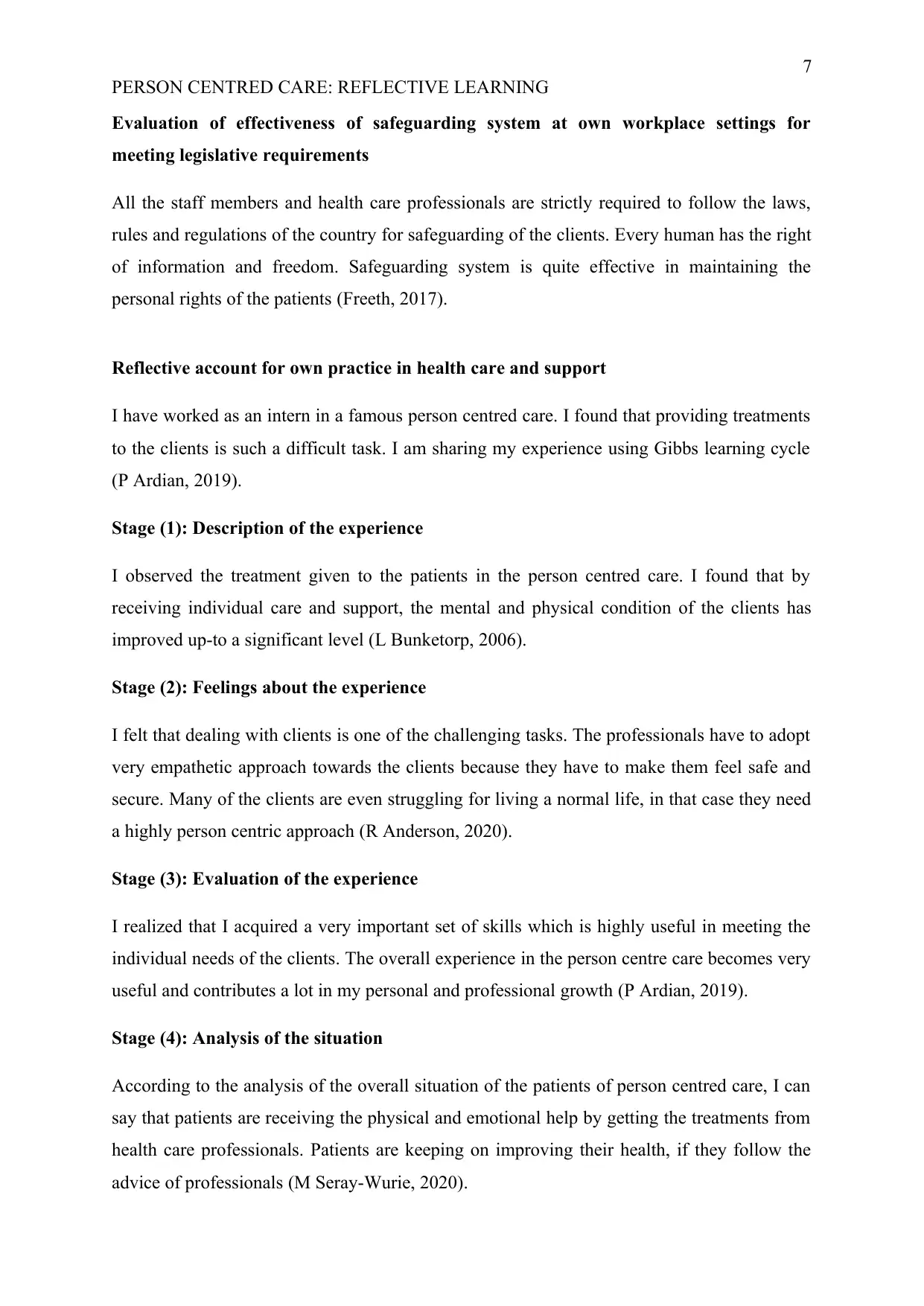
7
PERSON CENTRED CARE: REFLECTIVE LEARNING
Evaluation of effectiveness of safeguarding system at own workplace settings for
meeting legislative requirements
All the staff members and health care professionals are strictly required to follow the laws,
rules and regulations of the country for safeguarding of the clients. Every human has the right
of information and freedom. Safeguarding system is quite effective in maintaining the
personal rights of the patients (Freeth, 2017).
Reflective account for own practice in health care and support
I have worked as an intern in a famous person centred care. I found that providing treatments
to the clients is such a difficult task. I am sharing my experience using Gibbs learning cycle
(P Ardian, 2019).
Stage (1): Description of the experience
I observed the treatment given to the patients in the person centred care. I found that by
receiving individual care and support, the mental and physical condition of the clients has
improved up-to a significant level (L Bunketorp, 2006).
Stage (2): Feelings about the experience
I felt that dealing with clients is one of the challenging tasks. The professionals have to adopt
very empathetic approach towards the clients because they have to make them feel safe and
secure. Many of the clients are even struggling for living a normal life, in that case they need
a highly person centric approach (R Anderson, 2020).
Stage (3): Evaluation of the experience
I realized that I acquired a very important set of skills which is highly useful in meeting the
individual needs of the clients. The overall experience in the person centre care becomes very
useful and contributes a lot in my personal and professional growth (P Ardian, 2019).
Stage (4): Analysis of the situation
According to the analysis of the overall situation of the patients of person centred care, I can
say that patients are receiving the physical and emotional help by getting the treatments from
health care professionals. Patients are keeping on improving their health, if they follow the
advice of professionals (M Seray-Wurie, 2020).
PERSON CENTRED CARE: REFLECTIVE LEARNING
Evaluation of effectiveness of safeguarding system at own workplace settings for
meeting legislative requirements
All the staff members and health care professionals are strictly required to follow the laws,
rules and regulations of the country for safeguarding of the clients. Every human has the right
of information and freedom. Safeguarding system is quite effective in maintaining the
personal rights of the patients (Freeth, 2017).
Reflective account for own practice in health care and support
I have worked as an intern in a famous person centred care. I found that providing treatments
to the clients is such a difficult task. I am sharing my experience using Gibbs learning cycle
(P Ardian, 2019).
Stage (1): Description of the experience
I observed the treatment given to the patients in the person centred care. I found that by
receiving individual care and support, the mental and physical condition of the clients has
improved up-to a significant level (L Bunketorp, 2006).
Stage (2): Feelings about the experience
I felt that dealing with clients is one of the challenging tasks. The professionals have to adopt
very empathetic approach towards the clients because they have to make them feel safe and
secure. Many of the clients are even struggling for living a normal life, in that case they need
a highly person centric approach (R Anderson, 2020).
Stage (3): Evaluation of the experience
I realized that I acquired a very important set of skills which is highly useful in meeting the
individual needs of the clients. The overall experience in the person centre care becomes very
useful and contributes a lot in my personal and professional growth (P Ardian, 2019).
Stage (4): Analysis of the situation
According to the analysis of the overall situation of the patients of person centred care, I can
say that patients are receiving the physical and emotional help by getting the treatments from
health care professionals. Patients are keeping on improving their health, if they follow the
advice of professionals (M Seray-Wurie, 2020).
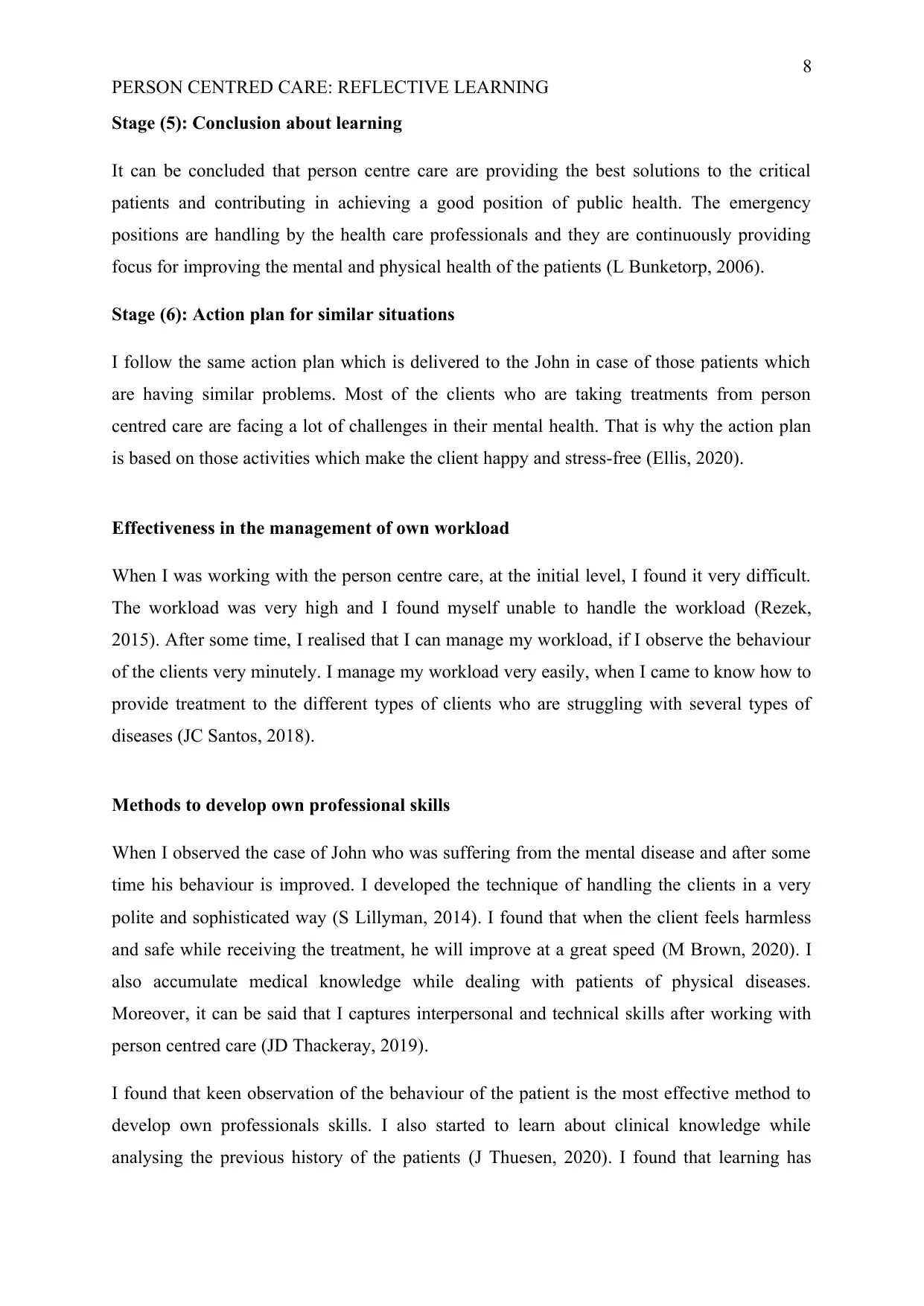
8
PERSON CENTRED CARE: REFLECTIVE LEARNING
Stage (5): Conclusion about learning
It can be concluded that person centre care are providing the best solutions to the critical
patients and contributing in achieving a good position of public health. The emergency
positions are handling by the health care professionals and they are continuously providing
focus for improving the mental and physical health of the patients (L Bunketorp, 2006).
Stage (6): Action plan for similar situations
I follow the same action plan which is delivered to the John in case of those patients which
are having similar problems. Most of the clients who are taking treatments from person
centred care are facing a lot of challenges in their mental health. That is why the action plan
is based on those activities which make the client happy and stress-free (Ellis, 2020).
Effectiveness in the management of own workload
When I was working with the person centre care, at the initial level, I found it very difficult.
The workload was very high and I found myself unable to handle the workload (Rezek,
2015). After some time, I realised that I can manage my workload, if I observe the behaviour
of the clients very minutely. I manage my workload very easily, when I came to know how to
provide treatment to the different types of clients who are struggling with several types of
diseases (JC Santos, 2018).
Methods to develop own professional skills
When I observed the case of John who was suffering from the mental disease and after some
time his behaviour is improved. I developed the technique of handling the clients in a very
polite and sophisticated way (S Lillyman, 2014). I found that when the client feels harmless
and safe while receiving the treatment, he will improve at a great speed (M Brown, 2020). I
also accumulate medical knowledge while dealing with patients of physical diseases.
Moreover, it can be said that I captures interpersonal and technical skills after working with
person centred care (JD Thackeray, 2019).
I found that keen observation of the behaviour of the patient is the most effective method to
develop own professionals skills. I also started to learn about clinical knowledge while
analysing the previous history of the patients (J Thuesen, 2020). I found that learning has
PERSON CENTRED CARE: REFLECTIVE LEARNING
Stage (5): Conclusion about learning
It can be concluded that person centre care are providing the best solutions to the critical
patients and contributing in achieving a good position of public health. The emergency
positions are handling by the health care professionals and they are continuously providing
focus for improving the mental and physical health of the patients (L Bunketorp, 2006).
Stage (6): Action plan for similar situations
I follow the same action plan which is delivered to the John in case of those patients which
are having similar problems. Most of the clients who are taking treatments from person
centred care are facing a lot of challenges in their mental health. That is why the action plan
is based on those activities which make the client happy and stress-free (Ellis, 2020).
Effectiveness in the management of own workload
When I was working with the person centre care, at the initial level, I found it very difficult.
The workload was very high and I found myself unable to handle the workload (Rezek,
2015). After some time, I realised that I can manage my workload, if I observe the behaviour
of the clients very minutely. I manage my workload very easily, when I came to know how to
provide treatment to the different types of clients who are struggling with several types of
diseases (JC Santos, 2018).
Methods to develop own professional skills
When I observed the case of John who was suffering from the mental disease and after some
time his behaviour is improved. I developed the technique of handling the clients in a very
polite and sophisticated way (S Lillyman, 2014). I found that when the client feels harmless
and safe while receiving the treatment, he will improve at a great speed (M Brown, 2020). I
also accumulate medical knowledge while dealing with patients of physical diseases.
Moreover, it can be said that I captures interpersonal and technical skills after working with
person centred care (JD Thackeray, 2019).
I found that keen observation of the behaviour of the patient is the most effective method to
develop own professionals skills. I also started to learn about clinical knowledge while
analysing the previous history of the patients (J Thuesen, 2020). I found that learning has
⊘ This is a preview!⊘
Do you want full access?
Subscribe today to unlock all pages.

Trusted by 1+ million students worldwide
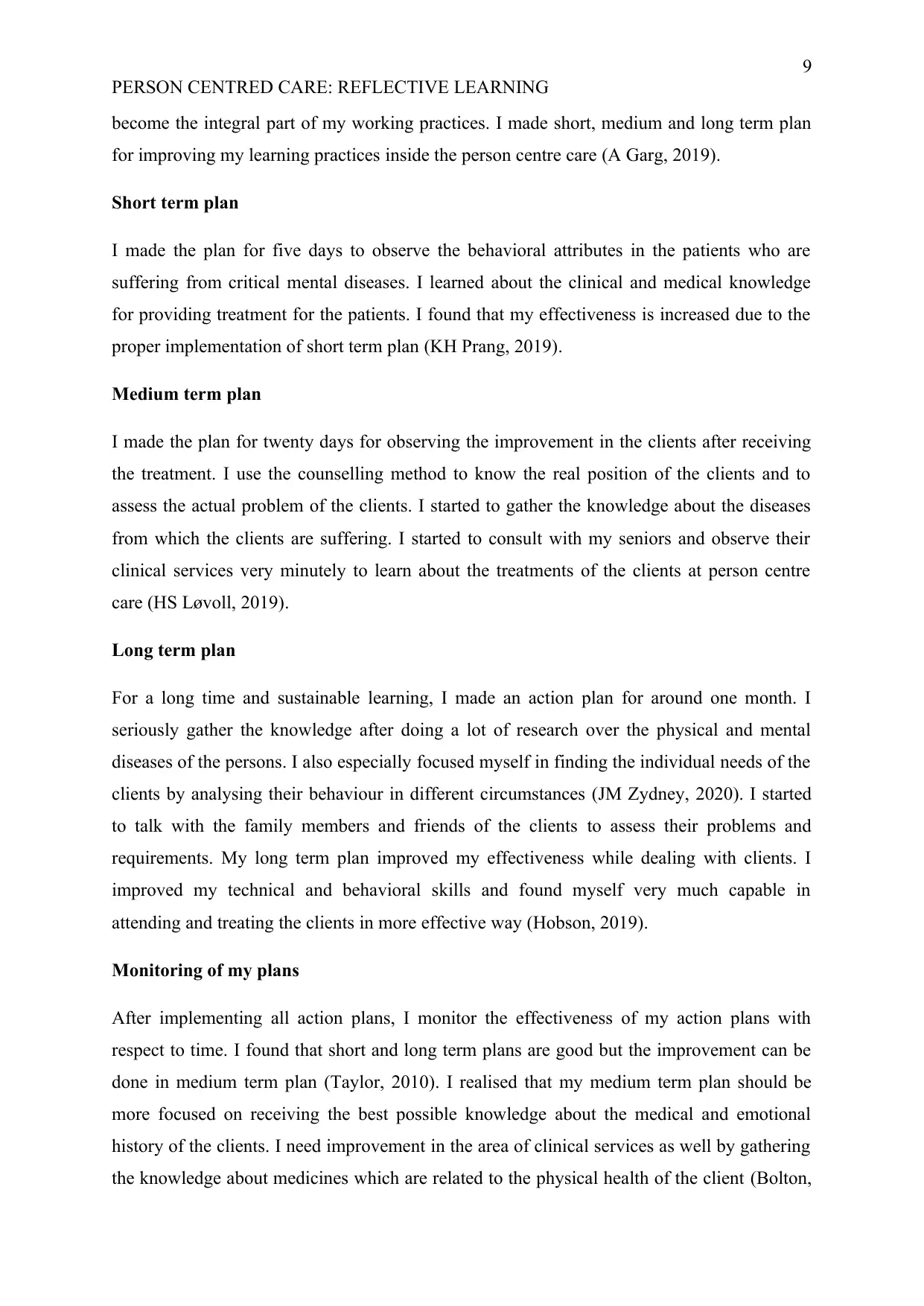
9
PERSON CENTRED CARE: REFLECTIVE LEARNING
become the integral part of my working practices. I made short, medium and long term plan
for improving my learning practices inside the person centre care (A Garg, 2019).
Short term plan
I made the plan for five days to observe the behavioral attributes in the patients who are
suffering from critical mental diseases. I learned about the clinical and medical knowledge
for providing treatment for the patients. I found that my effectiveness is increased due to the
proper implementation of short term plan (KH Prang, 2019).
Medium term plan
I made the plan for twenty days for observing the improvement in the clients after receiving
the treatment. I use the counselling method to know the real position of the clients and to
assess the actual problem of the clients. I started to gather the knowledge about the diseases
from which the clients are suffering. I started to consult with my seniors and observe their
clinical services very minutely to learn about the treatments of the clients at person centre
care (HS Løvoll, 2019).
Long term plan
For a long time and sustainable learning, I made an action plan for around one month. I
seriously gather the knowledge after doing a lot of research over the physical and mental
diseases of the persons. I also especially focused myself in finding the individual needs of the
clients by analysing their behaviour in different circumstances (JM Zydney, 2020). I started
to talk with the family members and friends of the clients to assess their problems and
requirements. My long term plan improved my effectiveness while dealing with clients. I
improved my technical and behavioral skills and found myself very much capable in
attending and treating the clients in more effective way (Hobson, 2019).
Monitoring of my plans
After implementing all action plans, I monitor the effectiveness of my action plans with
respect to time. I found that short and long term plans are good but the improvement can be
done in medium term plan (Taylor, 2010). I realised that my medium term plan should be
more focused on receiving the best possible knowledge about the medical and emotional
history of the clients. I need improvement in the area of clinical services as well by gathering
the knowledge about medicines which are related to the physical health of the client (Bolton,
PERSON CENTRED CARE: REFLECTIVE LEARNING
become the integral part of my working practices. I made short, medium and long term plan
for improving my learning practices inside the person centre care (A Garg, 2019).
Short term plan
I made the plan for five days to observe the behavioral attributes in the patients who are
suffering from critical mental diseases. I learned about the clinical and medical knowledge
for providing treatment for the patients. I found that my effectiveness is increased due to the
proper implementation of short term plan (KH Prang, 2019).
Medium term plan
I made the plan for twenty days for observing the improvement in the clients after receiving
the treatment. I use the counselling method to know the real position of the clients and to
assess the actual problem of the clients. I started to gather the knowledge about the diseases
from which the clients are suffering. I started to consult with my seniors and observe their
clinical services very minutely to learn about the treatments of the clients at person centre
care (HS Løvoll, 2019).
Long term plan
For a long time and sustainable learning, I made an action plan for around one month. I
seriously gather the knowledge after doing a lot of research over the physical and mental
diseases of the persons. I also especially focused myself in finding the individual needs of the
clients by analysing their behaviour in different circumstances (JM Zydney, 2020). I started
to talk with the family members and friends of the clients to assess their problems and
requirements. My long term plan improved my effectiveness while dealing with clients. I
improved my technical and behavioral skills and found myself very much capable in
attending and treating the clients in more effective way (Hobson, 2019).
Monitoring of my plans
After implementing all action plans, I monitor the effectiveness of my action plans with
respect to time. I found that short and long term plans are good but the improvement can be
done in medium term plan (Taylor, 2010). I realised that my medium term plan should be
more focused on receiving the best possible knowledge about the medical and emotional
history of the clients. I need improvement in the area of clinical services as well by gathering
the knowledge about medicines which are related to the physical health of the client (Bolton,
Paraphrase This Document
Need a fresh take? Get an instant paraphrase of this document with our AI Paraphraser
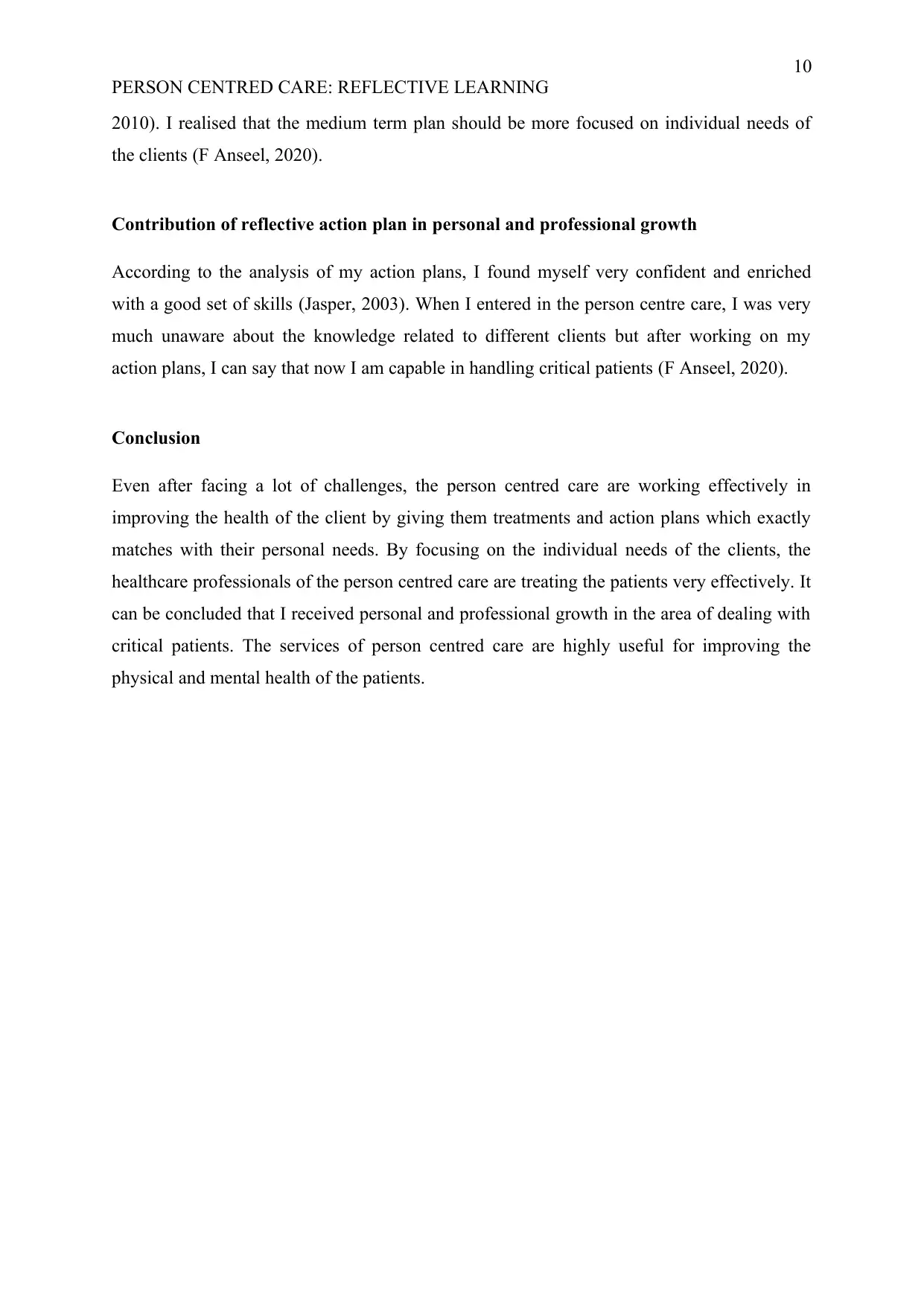
10
PERSON CENTRED CARE: REFLECTIVE LEARNING
2010). I realised that the medium term plan should be more focused on individual needs of
the clients (F Anseel, 2020).
Contribution of reflective action plan in personal and professional growth
According to the analysis of my action plans, I found myself very confident and enriched
with a good set of skills (Jasper, 2003). When I entered in the person centre care, I was very
much unaware about the knowledge related to different clients but after working on my
action plans, I can say that now I am capable in handling critical patients (F Anseel, 2020).
Conclusion
Even after facing a lot of challenges, the person centred care are working effectively in
improving the health of the client by giving them treatments and action plans which exactly
matches with their personal needs. By focusing on the individual needs of the clients, the
healthcare professionals of the person centred care are treating the patients very effectively. It
can be concluded that I received personal and professional growth in the area of dealing with
critical patients. The services of person centred care are highly useful for improving the
physical and mental health of the patients.
PERSON CENTRED CARE: REFLECTIVE LEARNING
2010). I realised that the medium term plan should be more focused on individual needs of
the clients (F Anseel, 2020).
Contribution of reflective action plan in personal and professional growth
According to the analysis of my action plans, I found myself very confident and enriched
with a good set of skills (Jasper, 2003). When I entered in the person centre care, I was very
much unaware about the knowledge related to different clients but after working on my
action plans, I can say that now I am capable in handling critical patients (F Anseel, 2020).
Conclusion
Even after facing a lot of challenges, the person centred care are working effectively in
improving the health of the client by giving them treatments and action plans which exactly
matches with their personal needs. By focusing on the individual needs of the clients, the
healthcare professionals of the person centred care are treating the patients very effectively. It
can be concluded that I received personal and professional growth in the area of dealing with
critical patients. The services of person centred care are highly useful for improving the
physical and mental health of the patients.
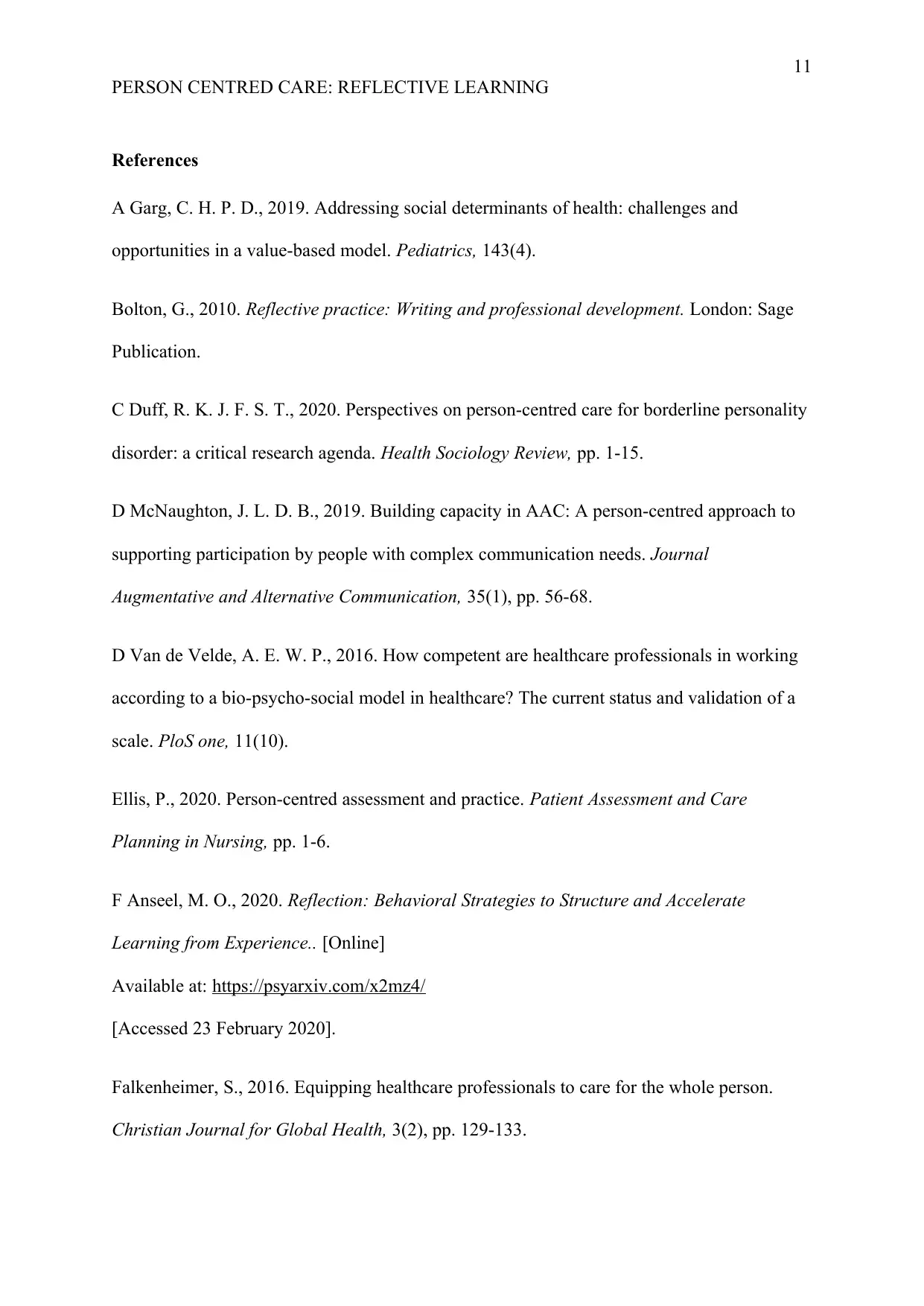
11
PERSON CENTRED CARE: REFLECTIVE LEARNING
References
A Garg, C. H. P. D., 2019. Addressing social determinants of health: challenges and
opportunities in a value-based model. Pediatrics, 143(4).
Bolton, G., 2010. Reflective practice: Writing and professional development. London: Sage
Publication.
C Duff, R. K. J. F. S. T., 2020. Perspectives on person-centred care for borderline personality
disorder: a critical research agenda. Health Sociology Review, pp. 1-15.
D McNaughton, J. L. D. B., 2019. Building capacity in AAC: A person-centred approach to
supporting participation by people with complex communication needs. Journal
Augmentative and Alternative Communication, 35(1), pp. 56-68.
D Van de Velde, A. E. W. P., 2016. How competent are healthcare professionals in working
according to a bio-psycho-social model in healthcare? The current status and validation of a
scale. PloS one, 11(10).
Ellis, P., 2020. Person-centred assessment and practice. Patient Assessment and Care
Planning in Nursing, pp. 1-6.
F Anseel, M. O., 2020. Reflection: Behavioral Strategies to Structure and Accelerate
Learning from Experience.. [Online]
Available at: https://psyarxiv.com/x2mz4/
[Accessed 23 February 2020].
Falkenheimer, S., 2016. Equipping healthcare professionals to care for the whole person.
Christian Journal for Global Health, 3(2), pp. 129-133.
PERSON CENTRED CARE: REFLECTIVE LEARNING
References
A Garg, C. H. P. D., 2019. Addressing social determinants of health: challenges and
opportunities in a value-based model. Pediatrics, 143(4).
Bolton, G., 2010. Reflective practice: Writing and professional development. London: Sage
Publication.
C Duff, R. K. J. F. S. T., 2020. Perspectives on person-centred care for borderline personality
disorder: a critical research agenda. Health Sociology Review, pp. 1-15.
D McNaughton, J. L. D. B., 2019. Building capacity in AAC: A person-centred approach to
supporting participation by people with complex communication needs. Journal
Augmentative and Alternative Communication, 35(1), pp. 56-68.
D Van de Velde, A. E. W. P., 2016. How competent are healthcare professionals in working
according to a bio-psycho-social model in healthcare? The current status and validation of a
scale. PloS one, 11(10).
Ellis, P., 2020. Person-centred assessment and practice. Patient Assessment and Care
Planning in Nursing, pp. 1-6.
F Anseel, M. O., 2020. Reflection: Behavioral Strategies to Structure and Accelerate
Learning from Experience.. [Online]
Available at: https://psyarxiv.com/x2mz4/
[Accessed 23 February 2020].
Falkenheimer, S., 2016. Equipping healthcare professionals to care for the whole person.
Christian Journal for Global Health, 3(2), pp. 129-133.
⊘ This is a preview!⊘
Do you want full access?
Subscribe today to unlock all pages.

Trusted by 1+ million students worldwide
1 out of 16
Related Documents
Your All-in-One AI-Powered Toolkit for Academic Success.
+13062052269
info@desklib.com
Available 24*7 on WhatsApp / Email
![[object Object]](/_next/static/media/star-bottom.7253800d.svg)
Unlock your academic potential
Copyright © 2020–2026 A2Z Services. All Rights Reserved. Developed and managed by ZUCOL.





